 |
ANNUAL MEETING The Ecological Society of America’s 98th Annual Meeting took place in Minneapolis, MN this year and was attended by 3,300 registrants.
Media outlets covering the meeting included The Huffington Post, Science Daily, NBC News, Nature and Science World Report. ESA MEMBERS IN ACTIONThroughout the summer, The Ecologist Goes to Washington podcast featured interviews from 2013 Graduate Student Policy Award winners CAITLIN MCDONOUGH MACKENZIE (Boston University), MATTHEW BERG (Texas A&M University), CARLOS SILVA (University of Maryland) and LINDSAY DEEL (West Virginia University). The foursome discussed their experiences on Capitol Hill meeting with policymakers and offered insights on communicating beyond the scientific community. Rapid Response Team
2013 ESA Early Career Fellow JULIAN OLDEN (University of Washington) led over 100 volunteers in an extensive whole-lake control effort of an invasive crayfish population. The project was covered on EarthFix and National Public Radio.
The Milwaukee Journal Sentinel published an opinion piece co-authored by DON WALLER and Jonathan Patz (University of Wisconsin-Madison).The op-ed outlined climate change’s impacts on the state of Wisconsin and called for increased dialogue on climate science among the state’s residents. Waller also wrote to the Wisconsin Department of Natural Resources, requesting that its land re-use plan for Badger Army Ammo facility encompass low-impact recreational activities that minimize native species decline. LETTERSThis summer, ESA signed onto a letter to key House and Senate appropriators urging sustained investment in critical wildlife and wetlands programs slated to see their funding eliminated in the House Interior, Environment and Related Agencies appropriations bill for Fiscal Year 2014.Targeted programs include the State & Tribal Wildlife Grants Program, North American Wetlands Conservation Fund, Neotropical Migratory Bird Fund, Forest Legacy Program and Land and Water Conservation Fund. In June, ESA joined the American Association for the Advancement of Science, American Institute of Biological Sciences, American Geophysical Union, the STEM Education Coalition and other scientific organizations to endorse H.R. 1891, the Science Laureates of the United States Act of 2013. Thislegislation would create a presidentially-appointed Science Laureate to annually recognize a distinguished scientist and representative of the science community to promote scientific research and education. The bill is sponsored by Rep. Zoe Lofgren (D-CA) and has wide bipartisan support. House Science, Space and Technology Committee Chairman Lamar Smith (R-TX) and Ranking Member Eddie Bernice Johnson (D-TX) are both cosponsors of the bill. ESA also joined with the National Wildlife Federation, the Nature Conservancy and other members of the National Environmental Coalition on Invasive Species in signing a letter of support for H.R. 1823, the Protecting Lakes Against Quaggas Act of 2013. The legislation seeks to prevent the importation or exportation of injurious quagga mussels. MEDIAFrontiersThe August issue of Frontiers in Ecology and the Environment showcases prescribed burns to manage forests and grasslands around the world. The issue is the journal’s first online-only special issue and like all Frontiers’ special issues, is open-access. Ecology
|
‘Follow’ ESA activities on Twitter, FacebookESA’s social media reach continues to expand. Our Facebook page has reached 2600 “likes” and we currently have 7,800 followers on Twitter. Keep track of science and policy developments, news about your fellow ecologists and join the conversation through our Facebook page and twitter. |
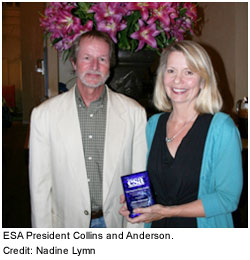 The meeting’s opening plenary featured the presentation of ESA’s 2013 Regional Policy Award to Ellen Anderson, Energy and Environment Senior Advisor to Minnesota Governor Mark Dayton. Anderson was recognized for her work in agriculture, energy and environmental polices not only through Dayton’s office, but for eighteen years as a state Senator in the Minnesota legislature.
The meeting’s opening plenary featured the presentation of ESA’s 2013 Regional Policy Award to Ellen Anderson, Energy and Environment Senior Advisor to Minnesota Governor Mark Dayton. Anderson was recognized for her work in agriculture, energy and environmental polices not only through Dayton’s office, but for eighteen years as a state Senator in the Minnesota legislature. 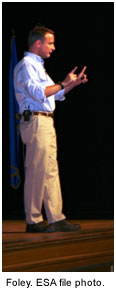 The award was followed by plenary speaker Jon Foley, director of University of Minnesota’s Institute on the Environment who, after giving a light-hearted overview of MN’s many attributes,
The award was followed by plenary speaker Jon Foley, director of University of Minnesota’s Institute on the Environment who, after giving a light-hearted overview of MN’s many attributes, 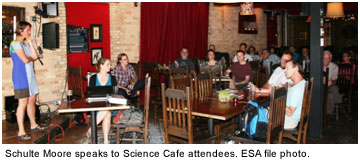 ESA also held its first Science Café for the public at the Aster Café on the Minneapolis riverfront. Lisa Schulte- Moore (Iowa State University) highlighted our global food needs and spoke about innovative agricultural methods to help farmers and keep fertilizers and soil from moving into water bodies as well as creating side benefits such as increased habitat for wildlife. Schulte-Moore is also a member of ESA’s Rapid Response Team.
ESA also held its first Science Café for the public at the Aster Café on the Minneapolis riverfront. Lisa Schulte- Moore (Iowa State University) highlighted our global food needs and spoke about innovative agricultural methods to help farmers and keep fertilizers and soil from moving into water bodies as well as creating side benefits such as increased habitat for wildlife. Schulte-Moore is also a member of ESA’s Rapid Response Team.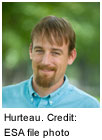 MATTHEW HURTEAU (Penn State University) was featured in an online interview by
MATTHEW HURTEAU (Penn State University) was featured in an online interview by 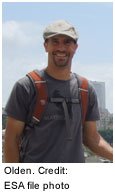 ROBERT PARMENTER (USDA Valles Caldera National Reserve Scientific Services Division) appeared in an hour-long PBS TV documentary entitled “
ROBERT PARMENTER (USDA Valles Caldera National Reserve Scientific Services Division) appeared in an hour-long PBS TV documentary entitled “ ALLISON SNOW (Ohio State University) was interviewed by
ALLISON SNOW (Ohio State University) was interviewed by 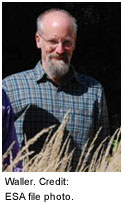 From her field location at Yellowstone National Park, MONICA TURNER (University of Wisconsin-Madison) spoke with Alan Bole, science editor for
From her field location at Yellowstone National Park, MONICA TURNER (University of Wisconsin-Madison) spoke with Alan Bole, science editor for